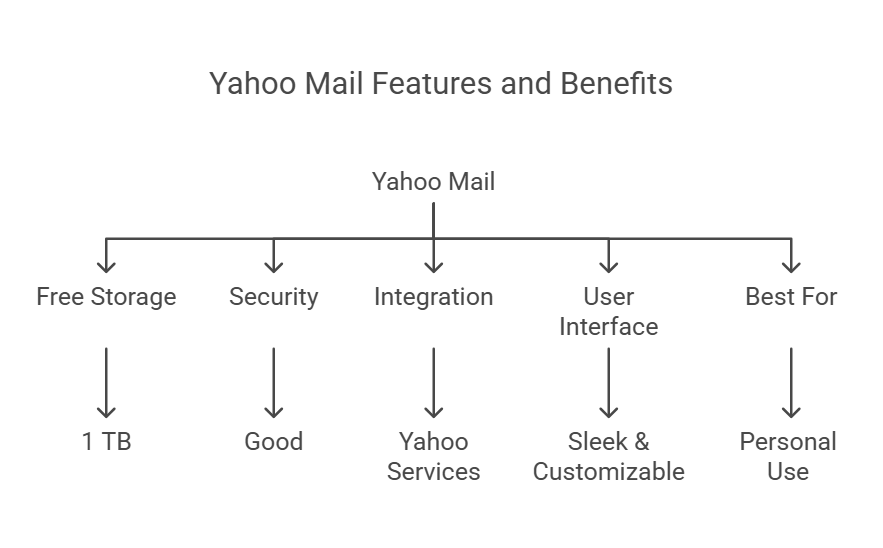In the ever-evolving world of email services, choosing the right platform can make a huge difference in your productivity, security, and overall experience. With Gmail dominating the market, how does it stack up against competitors like Outlook, Yahoo Mail, and ProtonMail in 2025? In this comprehensive comparison, we’ll break down the key features, pros, and cons of each service to help you decide which one is best for your needs.
Why Does Your Email Service Matter?
Your email service is more than just a tool for sending and receiving messages—it’s a hub for communication, organization, and collaboration. The right platform can:
Boost productivity with smart features.
Protect your data with advanced security.
Integrate seamlessly with other tools and apps.
Let’s dive into the top email services and see how they compare in 2025.
1. Gmail: The All-Rounder
Gmail remains one of the most popular email services, and for good reason.
Key Features:
Generous Storage: 15 GB free storage shared across Google Drive, Photos, and Gmail.
Smart Features: AI-powered spam filtering, Smart Compose, and Smart Reply.
Integration: Seamless integration with Google Workspace (Docs, Sheets, Meet, etc.).
Security: Two-factor authentication (2FA), confidential mode, and advanced phishing protection.
Customization: Labels, filters, and tabs for organizing your inbox.
Pros:
User-friendly interface.
Excellent spam filtering.
Free and paid plans available.
Works well on both desktop and mobile.
Cons:
Ads in the free version.
Privacy concerns due to data scanning for ad targeting.
2. Outlook: The Professional’s Choice
Microsoft’s Outlook is a favorite among professionals, especially those using Microsoft 365.
Key Features:
Integration: Deep integration with Microsoft 365 (Word, Excel, Teams, etc.).
Focused Inbox: Separates important emails from clutter.
Calendar and Tasks: Built-in calendar and task management tools.
Security: Advanced threat protection and encryption.
Pros:
Ideal for business users.
Robust calendar and scheduling features.
Excellent integration with Microsoft tools.
Cons:
Interface can feel cluttered.
Free version has limited storage (15 GB).
3. Yahoo Mail: The User-Friendly Option
Yahoo Mail has made a comeback in recent years, offering a sleek interface and useful features.
Key Features:
Generous Storage: 1 TB of free storage.
Customization: Themes and layouts to personalize your inbox.
Integration: Works with Yahoo News, Finance, and other services.
Security: End-to-end encryption for attachments.
Pros:
Easy to use.
Plenty of storage.
Great for personal use.
Cons:
Ads in the free version.
Limited integration with third-party tools.
4. ProtonMail: The Privacy Champion
ProtonMail is the go-to choice for users who prioritize privacy and security.
Key Features:
End-to-End Encryption: All emails are encrypted by default.
No Ads: No data mining or ad targeting.
Open Source: Transparent and auditable code.
Swiss-Based: Strong privacy laws protect your data.
Pros:
Unmatched privacy and security.
No ads or tracking.
Simple and clean interface.
Cons:
Limited free storage (500 MB).
Fewer features compared to Gmail or Outlook.
5. Apple Mail: The Ecosystem Player
Apple Mail is the default email service for Apple users, offering seamless integration with iOS and macOS.
Key Features:
Integration: Works seamlessly with iCloud, Calendar, and Reminders.
Privacy: Hide My Email feature for creating disposable addresses.
Siri Integration: Use voice commands to manage emails.
Pros:
Perfect for Apple ecosystem users.
Clean and intuitive interface.
Strong privacy features.
Cons:
Limited customization options.
Not ideal for non-Apple users.
Which Email Service is Best for You?
The best email service depends on your specific needs:
Gmail: Ideal for most users who want a balance of features, storage, and ease of use.
Outlook: Perfect for professionals and businesses using Microsoft 365.
Yahoo Mail: Great for personal use with plenty of storage.
ProtonMail: The top choice for privacy-focused users.
Apple Mail: Best for those deeply embedded in the Apple ecosystem.
Conclusion
In 2025, Gmail continues to lead the pack with its robust features, seamless integration, and user-friendly interface. However, competitors like Outlook, Yahoo Mail, ProtonMail, and Apple Mail offer unique advantages depending on your priorities.
Whether you value privacy, productivity, or ecosystem integration, there’s an email service tailored to your needs. Evaluate your requirements, try out a few options, and choose the one that helps you stay connected and productive in 2025 and beyond.














